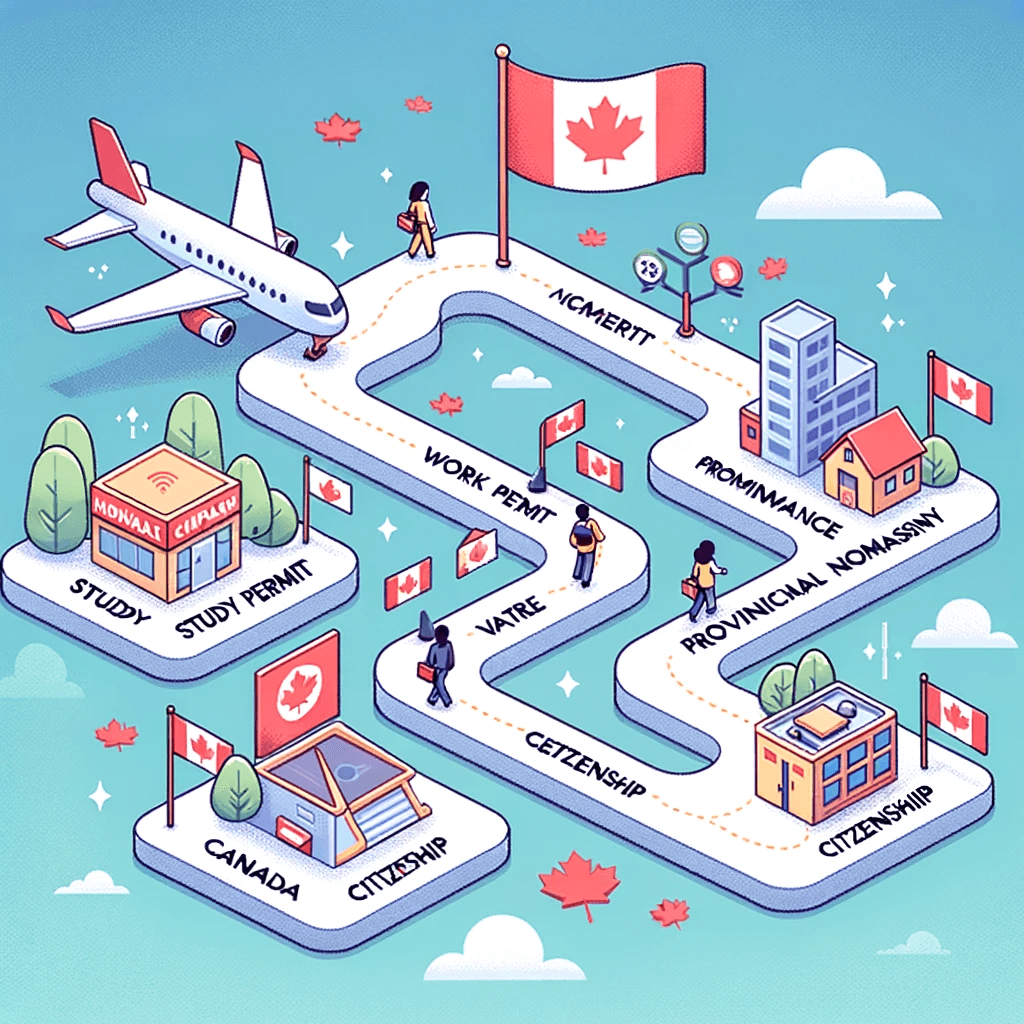How to Study and Work in Canada as an International Student?
Your Quick 30-Second Answer on How to Study and Work in Canada?
While studying, students can work off-campus for up to 20 hours per week, and full-time during scheduled breaks. A temporary extension allows students to work more hours until April 30, 2024. For post-graduation, eligibility for a Post-Graduation Work Permit (PGWP) depends on completing a program that leads to a degree, diploma, or certificate from eligible institutions. The policy providing an additional 18-month work permit to PGWP holders will not extend beyond December 31, 2023. Starting January 1, 2024, international students applying for a study permit in Canada need to show access to at least $20,000, reflecting the rising cost of living. This requirement will be adjusted annually based on Canada's low-income cut-off data. International education significantly contributes to Canada's economy, and Quebec has its own separate cost-of-living requirements for international students.
For an in-depth overview, please see the "Table of Contents" below.
Study and Work in Canada: Guide to Work and Study Program
Welcome to your essential guide on how to effectively study and work in Canada. Here, you'll find everything you need to know about the work and study in Canada process, along with insights into the Canada work and study program, to help you successfully navigate your educational and professional journey in Canada.
TABLE OF CONTENT
Basic Overview
1. Who should use this Guide?
2. Introduction: A Quick Look
3. Program and its Purpose?
Eligibility and Requirements
4. Who Can Work as a Student?
5. Eligibility Criteria
Procedures & Hours
6. Working Off-Campus
7. Work Hours and Limits
8. Restrictions in Work
9. Post-Graduation Employment
10. Study and Work Remotely
Tips and Best Practices
11. Frequently Asked Questions
12. Additional Resources

1. Who should use this Guide?
Choosing Canada for education or immigration is a smart move, but you'll need a student visa Canada (study permit) to pursue your academic dreams. I myself moved to Canada as a student several years ago. Like a roadmap, I carefully looked at my options on how to study in Canada, applying for a student visa and later work in Canada during and after study. I got top-class education, made new friends, and learned about Canadian culture. Today, I am not only a Canadian citizen but also a lawyer in Canada. Studying in Canada is a journey that gives you a lot of opportunities including transitioning from temporary residence to permanent residence. With the right steps and focus, anyone can achieve their Canadian dream.
Studying and working in Canada involves several key aspects that international students should be aware of. Canadian student visa holders may find the opportunity to visit other countries with more relaxed entry requirements.:
Work Opportunities While Studying
- Off-Campus Work: International students can work off-campus for up to 20 hours per week during regular academic sessions. During scheduled breaks like summer or winter holidays, students are allowed to work full-time.
- Temporary Policy Extensions: There's a temporary extension allowing international students to work off-campus for more hours until April 30, 2024. This is to help fill Canada’s labor market needs and support economic growth.
- Co-op and Internship: Students enrolled in programs that include a co-op or internship component can apply for a co-op work permit. This is necessary unless the co-op placement meets certain criteria, such as being authorized to work off-campus or the entire co-op placement taking place between January 1, 2024, and April 30, 2024.
Post-Graduation Work Opportunities
- Eligibility for Post-Graduation Work Permit (PGWP): To be eligible for PGWP, students must complete programs leading to a degree, diploma, or certificate from eligible institutions. However, there are exceptions such as not being eligible if the major part of the study program was completed through distance learning or if the student already received a PGWP.
- No Further Extensions for PGWP Holders: The temporary policy that provided an additional 18-month work permit to post-graduation work permit holders will not be extended beyond December 31, 2023.
Study Permit Requirements
- Increased Financial Requirements: From January 1, 2024, international students applying for a study permit in Canada must prove access to at least $20,000 in cash, a significant increase from the previous requirement of $10,000. This change reflects the rising cost of living in Canada and aims to ensure students are financially prepared for their stay.
- Annual Adjustments Based on LICO: The financial requirement will now be modified annually according to Statistics Canada’s low-income cut-off (LICO) data, ensuring that the financial requirements remain relevant with economic changes.
Additional Considerations
- Economic Contribution: International education is a significant economic driver in Canada, contributing over $22 billion annually and supporting numerous jobs.
- Quebec's Separate Threshold: Quebec has its own cost-of-living requirements for international students attending educational institutions in the province.
The Canadian government's adjustments aim to ensure that international students are well-prepared for their educational journey in Canada, taking into account financial readiness and support processes.
2. Introduction: A Quick Look at the Program

Working Off-Campus in Canada: A Gateway to Permanent Residency and Citizenship
Introduction: Personal Journey and Broader Context
As someone who transitioned from an international student to a proud Canadian citizen, I understand the profound impact that working off-campus can have on this journey. It's more than just earning extra money; it's about integrating into Canadian society, gaining valuable work experience, and laying a solid foundation for your future.
The Role of Off-Campus Work in Shaping Your Future in Canada
1. Gaining Work Experience: Working off-campus allows you to acquire work experience in the Canadian job market. This experience is not just beneficial for your resume but also crucial when applying for permanent residency, under programs like the Canadian Experience Class.
2. Building Networks: Off-campus jobs provide opportunities to build professional networks. These connections can be instrumental in finding better job opportunities and navigating the path towards permanent residency and citizenship.
3. Understanding Canadian Work Culture: Working in a Canadian environment helps you understand the local work culture and ethics, an essential aspect of integrating into the society.
Amplifying Your Suitability as an Applicant to Study and Work in Canada
1. Demonstrating Adaptability: Employers and immigration officials value adaptability. Showing that you can balance work and study effectively is a testament to your resilience.
2. Developing Language Skills: Working off-campus enhances your English or French language skills through practical, everyday use. Proficiency in either language is a key requirement for most immigration pathways.
3. Contributing to the Community: Engage in work that contributes to the local community. This involvement showcases your commitment to being a part of Canadian society.
Standing Out in a Competitive Field
1. Highlighting Unique Skills: In a pool of applicants, it's vital to highlight skills or experiences that set you apart. This could be specialized knowledge in your field of study or unique skills acquired through your work experience.
2. Showcasing Extra Efforts: If you volunteer or participate in community events, make sure to highlight these efforts. These activities demonstrate your willingness to go beyond the basic requirements and contribute positively to Canadian society.
3. Adding Value: Focus on how your presence in Canada adds value. This could be through the skills you bring to the job market, your cultural diversity, or your potential as a future leader in your community.
Conclusion: Charting a Path to Success
By understanding the importance of working off-campus and strategically using this experience, you can significantly enhance your journey towards permanent residency and eventually, Canadian citizenship. Remember, it's about showing how you, as an international student, can enrich the Canadian society both professionally and personally. Just like my journey led me to become a Barrister and Solicitor in Canada, your path can lead you to success and fulfillment in this diverse and welcoming country when you study and work in Canada.
3. What is this Program and it's Purpose?
Working off-campus as an international student in Canada involves certain eligibility requirements and regulations, and it plays a significant role in an international student's academic and personal growth in Canada.
Understanding the Basics: What Does It Mean to Work Off-Campus?
Definition and General Overview
International students in Canada are allowed to work off-campus without a work permit if they meet specific criteria.To work off-campus, students must be full-time students at a designated learning institution (DLI) and enrolled in a program that is at least six months long, leading to a degree, diploma, or certificate.They must also have a Social Insurance Number (SIN).
Eligibility Requirements to study and work in Canada
Part-time students can work off-campus under certain conditions, such as being in the last semester of their study program and having been full-time students in Canada until that last semester.Students on authorized leave from their studies, or those switching schools and not studying, cannot work off-campus. They can only resume working once they return to their studies.
Importance of Working Off-Campus
Academic and Personal Growth
Working off-campus allows international students to gain practical work experience in the Canadian job market, which can be crucial for their future career prospects. It provides opportunities to improve language skills, understand Canadian work culture, and integrate into the local community, enhancing their overall experience in Canada.
Work Hours and Limitations
During regular school terms or semesters, students can work up to 20 hours per week.During scheduled breaks in the school year, such as winter and summer holidays, students can work full-time.
Restrictions to Study and Work in Canada
Students can’t work off-campus if their study permit does not authorize it, or if they are only enrolled in an ESL/FSL program, taking general interest courses, or courses required to be accepted into a full-time program.
Working off-campus in Canada as an international student is not just about earning extra money; it's a vital part of the educational experience, offering real-world experience and opportunities for personal development. It prepares students for the professional world and helps in building a network that could be beneficial for future endeavors, including pathways to permanent residency and Canadian citizenship.
4. Who can Work as a Student?

What is Working Off-Campus?
If you are an international student in Canada, you may have the option to work in a job outside your school (this is what "off-campus" means). Here's what you need to know:
1. Who Can Work: You can work off-campus if you are a full-time student at a school that is allowed to have international students (called a Designated Learning Institution or DLI). Your study program should be at least six months long and lead to a degree, diploma, or certificate to study and work in Canada.
2. When You Can Start Working: You can start working in Canada when your study program begins. You can't work before your studies start.
3. Work Permit Not Needed: If you meet the above conditions, you don't need a separate work permit to work off-campus.
Why Is Working Off-Campus Important?
1. Gain Work Experience: Working off-campus helps you get Canadian work experience. This is really valuable for your resume and important if you want to stay in Canada after you finish your studies.
2. Build Networks: You can meet new people and make connections that could help you find better jobs in the future.
3. Learn About Canadian Work Culture: Working in Canada helps you understand how things work in Canadian workplaces, which is good for your personal growth and future career.
How to Stand Out as an Applicant
1. Highlight Unique Skills: Think about what special skills or experiences you have that others might not. These can make you stand out in job applications and also in your future plans to stay in Canada.
2. Show How You Add Value: Think about how you can show that you would be a good worker and a good part of the community. This could be through things like volunteer work or special projects you've worked on.
3. Be Adaptable and Engaged: Show that you can handle different kinds of work and are willing to learn new things. Being involved in your community can also help show this.
Remember, working off-campus as an international student is more than just a job. It's a chance to grow, learn, and set yourself up for a successful future in Canada.
5. What are Eligibility Criteria for this Program?
Here are the eligibility criteria and qualifications needed to study and work in Canada:
PROGRAM REQUIREMENTS
Full-Time Student at a Designated Learning Institution: Must be a full-time student at a DLI.
Enrolled in a Qualifying Program: Must be enrolled in a post-secondary academic, vocational, or professional training program, or a secondary-level vocational program in Quebec.
Program Duration: The study program must be at least 6 months long and lead to a degree, diploma, or certificate.
Study Program Commencement: Must have started studying.
Social Insurance Number (SIN): Must have a SIN to work in Canada.
Part-Time Students: Can work off-campus in the last semester of their study program if they were full-time students in Canada up until their last semester.
Authorized Leave: Cannot work off-campus during an authorized leave from studies or when switching schools and not studying.
Work Conditions: Can work up to 20 hours per week during regular school terms/semesters, and full-time during scheduled breaks like winter and summer holidays.
Restrictions: Cannot work off-campus if the study permit does not authorize it, or if enrolled only in ESL/FSL program, general interest courses, or prerequisite courses for a full-time program.
Off-Campus Work Eligibility for International Students in Canada
1. Comprehensive Criteria for Eligibility
- Full-Time Student Status: To work off-campus, you must be enrolled full-time at a Designated Learning Institution (DLI). This means your primary focus is your studies.
- Program Duration: Your study program should be a minimum of six months and lead to a recognized degree, diploma, or certificate.
- Start Time for Work: You're only allowed to start working in Canada once your study program begins, not before.
- Requirement of a Social Insurance Number (SIN): To legally work in Canada, you need a SIN, a unique 9-digit number.
2. Clarifying Common Misconceptions
- No Need for Separate Work Permit: If you meet the eligibility criteria, you do not require an additional work permit to work off-campus.
- Restricted Work Hours: There's a limit of 20 hours per week of work during academic sessions to study and work in Canada, ensuring your studies remain a priority.
3. Specific Guidelines for Part-Time Students
- Final Semester Exception: Part-time students can work off-campus only in their final semester and if they've maintained full-time status in the previous terms.
4. Understanding the Impact of Authorized Leave
- Work Restrictions During Leave: If you're on an authorized break from studies or switching schools, your right to work off-campus is paused. You can resume working once your studies restart.
Enhancing Your Application to Work Off-Campus
5. Strategies to Amplify Your Suitability
- Showcase Unique Skills: Emphasize any special skills or experiences you possess, especially those in demand in the Canadian job market.
- Demonstrate Adaptability: Engage in activities that show your ability to adapt to new environments and challenges.
6. Strategies for Adding Value
- Contribution to the Community: Illustrate how your work and presence in Canada will benefit the community, both economically and culturally.
- Community Engagement: Participate in volunteer work or community events, showcasing your commitment to Canadian values.
7. Advanced Application Strategies
- Networking: Establish connections in your academic and professional field to open up future employment opportunities.
- Continuous Skill Improvement: Enhance your language proficiency and cultural understanding to integrate more effectively into Canadian society.
In this guide, we've detailed every aspect of working off-campus as an international student in Canada, under programs like 'Study and work in Canada', 'Work and study in Canada', and the 'Canada work and study program'. Understanding these nuanced guidelines and actively working to enhance your application can significantly improve your chances of not only finding employment but also standing out as a valuable member of the Canadian community.
6. Key Procedures for Working Off-Campus

Key Procedures for International Students Working Off-Campus in Canada
1. Obtaining a Social Insurance Number (SIN): Step-by-Step Guide
- Apply Online or In Person: International students can apply for a SIN either online or in person at a Service Canada Centre.
- Documents Required: You'll need to provide primary identity documents like a birth certificate, a certificate of Canadian Citizenship, Permanent Resident card, Confirmation of Permanent Residence (COPR), or a study permit indicating you “may accept employment” or “may work” in Canada.
2. Work Conditions on Study Permit to Study and Work in Canada
- Regular Academic Sessions: As of June 1, 2014, eligible students can work up to 20 hours per week during regular academic sessions.
- Scheduled Breaks: Students can work full-time during regularly scheduled breaks like winter and summer holidays.
- Public Policy Adjustment: From November 15, 2022, to December 31, 2023, certain students can work more than 20 hours per week during an academic session if their study permit application was received by IRCC on or before October 7, 2022.
- Intensive Programs: Students in intensive programs without regularly scheduled breaks may work a maximum of 20 hours per week throughout their program.
- Part-Time in Final Academic Session: Students who need a part-time course load in their final academic session to complete their program can work full-time during the break before their last semester and up to 20 hours per week during their final academic session.
Expert Insights: Standing Out as an Off-Campus Worker
3. Amplifying Applicant Suitability
- Highlight In-Demand Skills: Emphasize skills that are sought after in the Canadian job market. This can range from technical expertise to soft skills like communication and adaptability.
- Cultural Integration: Show your efforts to integrate into the Canadian culture through community engagement and understanding of local work ethics.
4. Adding Value to Canadian Society
- Community Contribution: Engage in volunteer activities or initiatives that demonstrate your willingness to be an active member of the community.
- Leverage Unique Background: Use your unique cultural or educational background to offer diverse perspectives in your workplace.
5. Advanced Application Strategies to Study and Work in Canada
- Networking and Relationships: Build connections within your field of study and work. Attend events, join relevant groups, and actively engage in conversations related to your field.
- Continuous Learning: Always seek opportunities to learn and grow. This might include taking additional courses, attending workshops, or engaging in other educational activities.
By understanding the requirements and strategically positioning yourself as a valuable contributor to Canadian society, you can significantly enhance your experience and prospects as an international student working off-campus in Canada. This approach not only benefits your immediate job prospects but also sets a solid foundation for your future in Canada.
7. Work Hours and Limitations
Work Hours and Limitations to Study and Work in Canada
Understanding Off-Campus Work Hours
1. Work During Regular Academic Terms
- Part-Time Work Cap: International students can work off-campus for up to 20 hours per week during their academic sessions. This rule helps ensure that their studies remain the primary focus.
- Balancing Multiple Jobs: Students have the flexibility to split these 20 hours across multiple jobs, offering a chance to gain varied experiences.
2. Working Full-Time During School Breaks
- Full-Time Employment Opportunity: During scheduled breaks, like winter or summer holidays, students can work full-time. This period is an excellent opportunity to gain more intensive work experience.
- Eligibility for Full-Time Work: To qualify for full-time work during breaks, students need to maintain full-time status before and after these breaks.
Maximizing Off-Campus Work Experience
3. Effective Time Management
- Balancing Studies and Work: Managing your time effectively is crucial to maintain a good balance between work commitments and academic responsibilities.
4. Seeking Relevant Work Opportunities
- Aligning Work with Academic Goals: Try to find off-campus work that complements your field of study. This not only enriches your learning experience but also bolsters your professional trajectory.
5. Skill Development
- Acquiring Marketable Skills: Utilize your off-campus job to develop skills that are valuable in the Canadian job market. These might include technical skills specific to your field or universally valued soft skills.
6. Networking and Professional Growth
- Building Professional Networks: Use your off-campus work to build connections in your field. These networks can be instrumental in opening doors to future job opportunities.
7. Community Involvement
- Engaging Beyond Work: Participate in community events or volunteer work to showcase your commitment to being an integral part of Canadian society.
8. Adding Value to Your Work Experience
- Going Beyond the Job Description: Look for opportunities within your off-campus work to take on additional responsibilities or projects. This proactive approach can set you apart as a dedicated and versatile worker.
By understanding and strategically navigating the rules around off-campus work in Canada, international students in programs like 'Study and work in Canada', 'Work and study in Canada', and the 'Canada work and study program' can significantly enhance their study experience and lay a strong foundation for their future career in Canada.
Public Policy Exceptions: Notably, from November 15, 2022, to December 31, 2023, certain students are permitted to work off campus more than 20 hours per week during an academic session under specific conditions set by a public policy exemption.
8. Restrictions and Changes in Off-Campus Work

Restrictions and Changes in Off-Campus Work for International Students in Canada
1. Categories of Students Ineligible for Off-Campus Work
- General Interest Program Students: If you are enrolled in a program that is considered for general interest or self-improvement, such as certain ESL/FSL courses, you are not eligible for off-campus work.
- Preparatory Courses: Those undertaking courses or programs that are prerequisites for enrollment at a Designated Learning Institution (DLI) are also ineligible to study and work in Canada simultaneously.
2. Impact of Changing Study Situations
- Transition to Part-Time Status: If you switch from full-time to part-time status during a regular academic session (for instance, by dropping courses), you must stop working off-campus immediately.
3. Adjusting Study Permit Conditions
- Work Hours Limitation: Eligible students can work up to 20 hours per week during academic sessions and full-time during regularly scheduled breaks, regardless of their course load.
- Commencing Studies Requirement: You must have started your program of study at a DLI in Canada to be eligible for off-campus work.
- Consequences of Non-Compliance: Not adhering to the study permit conditions or working without authorization can lead to enforcement action and negatively impact future immigration applications, such as the refusal of a subsequent study or work permit.
Enhancing Your Profile for Off-Campus Work
4. Strategies for Eligibility and Compliance
- Understand Your Program: Be clear about your program’s nature and ensure it meets the criteria for off-campus work eligibility.
- Maintain Full-Time Status: To remain eligible, prioritize maintaining your full-time student status throughout your academic journey.
5. Standing Out in the Job Market
- Proactive Adaptation: Show adaptability by understanding and adhering to Canadian work standards and study permit conditions.
- Showcasing Skills and Contribution: In your job applications and interviews, highlight skills that align with the needs of the Canadian job market and demonstrate how you can contribute positively to your workplace and community.
This detailed guide is intended to help international students navigate the 'Study and work in Canada', 'Work and study in Canada', and 'Canada work and study program' with a clear understanding of the eligibility criteria, restrictions, and strategies for successful off-campus employment in Canada.
9. Post-Graduation Employment for International Students
Post-Graduation Employment for International Students in Canada
International students in Canada have distinct options and procedures to follow for employment after completing their study programs. This guide, optimized for 'Study and work in Canada', 'Work and study in Canada', and 'Canada work and study program', delves into these aspects:
1. Working After Completing the Study Program
- Post-Graduation Work Permit (PGWP) Program: The PGWP Program permits students who have graduated from eligible Canadian Designated Learning Institutions (DLIs) to obtain an open work permit. This work experience is crucial for qualifying for permanent residence in Canada through the Canadian Experience Class within Express Entry.
- Eligibility to Work While Waiting for PGWP Decision: Students who have completed their program of study can work while waiting for a decision on their PGWP application, provided they meet certain criteria, including holding a valid study permit at the time of the PGWP application and being authorized to work off-campus.
2. Applying for Work Permits after you study and work in Canada
- Application Timeline: You can apply for a PGWP from inside Canada or another country, as long as you are eligible. The application must be made within 180 days after graduation.
- Required Documents: To apply, you need to confirm that you attended and completed your program, including the name and length of your program. Acceptable documents for confirmation include your degree or diploma, transcript, or an official letter from your school.
- Application Process: Depending on where you are applying from, you must usually apply online. The process includes creating an online account, preparing answers for an online tool, and knowing the fees to be paid. These fees include processing fees and biometrics.
- Paper Application Option: If applying from outside Canada, you can submit a paper application. This involves getting an application package, completing your application with all necessary documents, and paying application fees.
3. Advanced Strategies for a Successful Transition
- Showcasing Canadian Work Experience: Emphasize any Canadian work experience gained through internships, co-op placements, or part-time work during your studies.
- Networking and Continuous Learning: Build and maintain professional relationships in Canada. Engage in continuous learning and skill development relevant to your field.
4. Contributing Beyond Work
- Community Engagement: Demonstrate your involvement in Canadian society through volunteer work or community projects, showcasing your adaptability and willingness to integrate.
By understanding and strategically navigating the post-graduation work options and application process, international students can effectively transition from study to work in Canada, enhancing their prospects for long-term success and integration into Canadian society.
10. Study and Work in Canada for Employers Remotely
International Aspects: Working for Canadian Employers from Outside Canada
Considerations for International Students Working Remotely
1. Eligibility for Off-Campus Work
- International students with a valid study permit may work for Canadian employers off-campus during their studies. They are allowed to work up to 20 hours a week while classes are in session and full-time during scheduled breaks.
2. Co-op Placements and Internships
- For co-op placements or internships, international students need a valid study permit and a letter from their school confirming the necessity of work placements for their degree. The work experience must account for 50% or less of their study program.
- During the COVID-19 pandemic, many international students studying online from abroad were allowed to complete Canadian work placements remotely without requiring a co-op work permit
Remote Work Permissibility: International students in Canada are allowed to work remotely for an employer located outside of Canada. This opportunity is available as long as they meet the conditions of their study permit to study and work in Canada. This type of remote work does not count towards the 20 hours per week off-campus work limit imposed on international students during academic sessions.
Working Remotely for Canadian Employers
3. Adaptation to Remote Work
- International students who find themselves outside Canada but enrolled in Canadian educational institutions can potentially work remotely for Canadian employers. This scenario became more common during the COVID-19 pandemic, highlighting the flexibility in work arrangements.
4. Leveraging Technology
- To effectively work remotely for a Canadian employer, students should be adept at using digital communication tools and project management software, ensuring productivity and seamless collaboration.
5. Understanding Legal and Tax Implications
- It's crucial to understand the legal and tax implications of working remotely for a Canadian employer from outside Canada. This includes understanding your employment rights and any tax obligations in both Canada and your home country.
6. Building Professional Networks
- Remote work offers a unique opportunity to build professional networks within Canadian industries, even while residing outside Canada.
Balancing Work and Study for Long-term Success
2. Balancing Work and Study
- International students should strategically manage their time and responsibilities to maintain a balance between their studies and any form of employment, including remote work.
3. Building a Global Professional Network
- Working for an employer outside Canada, even remotely, offers a unique opportunity to build a global professional network, which can be beneficial for future career prospects.
4. Gaining Diverse Work Experience
- Engaging in work with international employers allows students to gain diverse professional experiences, enhancing their resumes and making them more attractive candidates in the global job market.
5. Preparing for Future Opportunities
- This experience can be particularly beneficial for those who plan to return to their home country or move to another country after their studies, as it demonstrates adaptability and international work experience.
For international students exploring information on how to study and work in Canada, understanding these aspects of working remotely for employers outside Canada is crucial. It not only allows them to gain valuable experience but also to maintain compliance with their study permit conditions, ensuring their continued eligibility to study and work in Canada.
11. Common Questions (FAQs)
1. How does the choice of study program influence post-graduation work opportunities in Canada?
1. How does the choice of study program influence post-graduation work opportunities in Canada?
Selecting a study program aligned with in-demand skills in Canada's job market can significantly enhance post-graduation employment prospects.
2. What strategies can maximize the chances of obtaining a Post-Graduation Work Permit (PGWP)?
2. What strategies can maximize the chances of obtaining a Post-Graduation Work Permit (PGWP)?
Completing your program successfully and gaining Canadian work experience through internships or co-op placements during studies can bolster PGWP eligibility.
3. How does part-time study and work in Canada affect future permanent residency applications?
3. How does part-time study and work in Canada affect future permanent residency applications?
Transitioning to part-time study might impact the eligibility for certain immigration pathways that require full-time study status, such as the Canadian Experience Class.
4. What are the hidden challenges international students face in the Canadian job market, and how can they be overcome?
4. What are the hidden challenges international students face in the Canadian job market, and how can they be overcome?
Cultural differences and local work experience might pose challenges. Overcoming these involves actively engaging in networking events and understanding Canadian workplace culture.
5. How can international students leverage co-op programs for long-term career success in Canada?
5. How can international students leverage co-op programs for long-term career success in Canada?
Co-op programs offer practical experience and networking opportunities in your field, providing a solid foundation for a long-term career in Canada.
6. What unique contributions can international students make to the Canadian economy and society?
6. What unique contributions can international students make to the Canadian economy and society?
International students bring diverse perspectives and skills, contributing to Canada's multicultural society and dynamic workforce.
7. How does the Canadian job market's current trends impact the selection of study programs for international students?
7. How does the Canadian job market's current trends impact the selection of study programs for international students?
Keeping abreast of job market trends can guide international students to select programs that will offer them the most advantageous career opportunities post-graduation.
8. How can international students navigate to study and work in Canada effectively?
8. How can international students navigate to study and work in Canada effectively?
Understanding the specific requirements of work permits and seeking guidance from immigration consultants or services at their educational institution can ease this transition.
9. What are the lesser-known benefits of the 'Canada work and study program' for international students' personal and professional development?
9. What are the lesser-known benefits of the 'Canada work and study program' for international students' personal and professional development?
Apart from work experience, the program offers cultural immersion, language proficiency enhancement, and development of a global mindset.
10. How can international students ensure compliance with Canadian immigration laws while maximizing their study and work experience?
10. How can international students ensure compliance with Canadian immigration laws while maximizing their study and work experience?
Staying informed about the latest immigration laws and regulations, and seeking advice from legal experts or student services, is crucial to ensure compliance.
These FAQs provide further clarity on various aspects of how to study and work in Canada. Always refer to official guidelines and consult with immigration experts for the most accurate and up-to-date information tailored to your specific situation.
12. Where to Find Resources?
To stay updated with the latest rules and regulations, application processes, forms, and other details related to study and work in Canada, consider visiting this government website: Work off campus as an international student

Kamal Akhtar (Immigration Lawyer)
Barrister, Solicitor & Notary Public
BCOM; MBA; LL.B; LL.M (York University, Toronto)
As the founder of this website and your guide through the complexities of Canadian immigration law, my academic credentials include a Bachelor of Law (LL.B) and Master of Law (LL.M) from York University, Toronto, complemented by an Honours Diploma in Immigration Consulting. I am a lawyer licensed by the Law Society of Ontario (LSO). My affiliation with legal associations such as the Canadian Immigration Lawyers Association (CILA), the Canadian Association of Professional Immigration Consultants (CAPIC), the Canadian Bar Association (CBA), and the Ontario Bar Association (OBA) underscores my commitment to immigration policies and practices. I share insights shaped by over 25 years of legal experience. Please note that information on this website does not constitute legal or professional advice.


